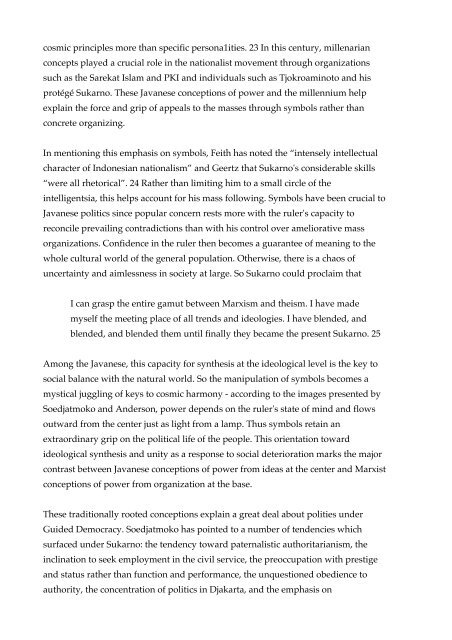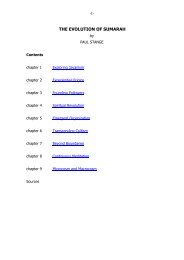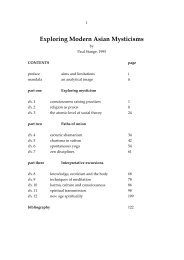Javanese Mystical and Marxist Dialectics - Paul Stange
Javanese Mystical and Marxist Dialectics - Paul Stange
Javanese Mystical and Marxist Dialectics - Paul Stange
Create successful ePaper yourself
Turn your PDF publications into a flip-book with our unique Google optimized e-Paper software.
cosmic principles more than specific persona1ities. 23 In this century, millenarianconcepts played a crucial role in the nationalist movement through organizationssuch as the Sarekat Islam <strong>and</strong> PKI <strong>and</strong> individuals such as Tjokroaminoto <strong>and</strong> hisprotégé Sukarno. These <strong>Javanese</strong> conceptions of power <strong>and</strong> the millennium helpexplain the force <strong>and</strong> grip of appeals to the masses through symbols rather thanconcrete organizing.In mentioning this emphasis on symbols, Feith has noted the “intensely intellectualcharacter of Indonesian nationalism” <strong>and</strong> Geertz that Sukarno's considerable skills“were all rhetorical”. 24 Rather than limiting him to a small circle of theintelligentsia, this helps account for his mass following. Symbols have been crucial to<strong>Javanese</strong> politics since popular concern rests more with the ruler's capacity toreconcile prevailing contradictions than with his control over ameliorative massorganizations. Confidence in the ruler then becomes a guarantee of meaning to thewhole cultural world of the general population. Otherwise, there is a chaos ofuncertainty <strong>and</strong> aimlessness in society at large. So Sukarno could proclaim thatI can grasp the entire gamut between Marxism <strong>and</strong> theism. I have mademyself the meeting place of all trends <strong>and</strong> ideologies. I have blended, <strong>and</strong>blended, <strong>and</strong> blended them until finally they became the present Sukarno. 25Among the <strong>Javanese</strong>, this capacity for synthesis at the ideological level is the key tosocial balance with the natural world. So the manipulation of symbols becomes amystical juggling of keys to cosmic harmony - according to the images presented bySoedjatmoko <strong>and</strong> Anderson, power depends on the ruler's state of mind <strong>and</strong> flowsoutward from the center just as light from a lamp. Thus symbols retain anextraordinary grip on the political life of the people. This orientation towardideological synthesis <strong>and</strong> unity as a response to social deterioration marks the majorcontrast between <strong>Javanese</strong> conceptions of power from ideas at the center <strong>and</strong> <strong>Marxist</strong>conceptions of power from organization at the base.These traditionally rooted conceptions explain a great deal about polities underGuided Democracy. Soedjatmoko has pointed to a number of tendencies whichsurfaced under Sukarno: the tendency toward paternalistic authoritarianism, theinclination to seek employment in the civil service, the preoccupation with prestige<strong>and</strong> status rather than function <strong>and</strong> performance, the unquestioned obedience toauthority, the concentration of politics in Djakarta, <strong>and</strong> the emphasis on




